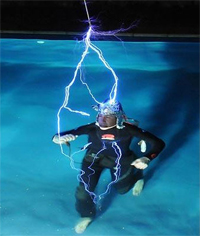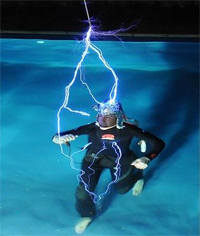
 A career in science doesn’t necessarily mean being cooped up in a lab all day or sitting behind a computer. The fact that science inquires into literally every part of our world means that you can pursue scientific careers in the oddest of places, from the tops of volcanoes to outer space. Check out these real and bizarre science jobs that may leave you reconsidering your current career.
A career in science doesn’t necessarily mean being cooped up in a lab all day or sitting behind a computer. The fact that science inquires into literally every part of our world means that you can pursue scientific careers in the oddest of places, from the tops of volcanoes to outer space. Check out these real and bizarre science jobs that may leave you reconsidering your current career.
1. Microbe Hunter: Crazy scientists, they’ll study anything. Even tiny bacteria that live in the most extreme climates, like hot springs or deep-ocean thermal vents. Microbe hunters are a particular type of microbiologist that scour the earth for these tiny, extremophile life forms. Microbe hunters travel for research, get samples of their life form, and head back to the lab to study its growth and characteristics.
• Necessary Education: Most need at least a master’s degree in biology, geochemistry, or a related field, although a PhD will allow for more research opportunities.
• More Info: the BLS
2. Volcanologist: Volcanologists are truly fearless scientists. They stake out active volcanoes, and decide if they are going to erupt or not (a wrong decision may cost many their lives!). They collect magma, analyze rock chemistry, and map volcanoes.
• Necessary Education: You’ll need a PhD in geology to become a true volcanologist.
• More Info: Oregon State
3. Animal Therapist: Animal therapists don’t give therapy to animals (although that might be fun); they help train and take care of animals that are used to give therapy to others. These animals range from the usual cats and dogs, to more exotic ones like miniature horses. Some therapists even train dolphins for use with children who have autism and developmental disabilities.
• Necessary Education: A bachelor’s in psychology or sociology is a good starting point. Animal training is necessary, and depends on what type of animal you would like to work with.
• More Info: Scientific American
4. Firework Designer: Have you ever wondered who understands the science behind those wonderful controlled explosions we call fireworks? Chemists, that’s who. Fireworks designers are chemists that work chemical compounds to create the brilliant colors and kabooms associated with New Years and the Fourth of July.
• Necessary Education: You’ll need a PhD in chemistry in order to do research on new fireworks compounds and to design them yourself.
• More Info: Kansas State University
5. Food Scientist: Sure, we’ve all joked about wanting to be food taste testers at the Hershey factory. Food scientists don’t eat food for a living, but they do design it, engineer it, and research it. Imagine designing a creamier chocolate bar, or one that stays fresher longer. And, how cool would it be to engineer foods for third world countries with a higher nutrient content?
• Necessary Education: Food scientists need at least a B.S. degree with courses in food analysis, microbiology, and food engineering.
• More Info: The BLS
6. Space Psychologist: Going up into space isn’t easy. Astronauts have to deal with the intense force upon liftoff, not to mention the fact their fingernails often fall out in zero gravity! Space psychologists work with astronauts, to help them cope with things like weightlessness and the all-around strange environment in space. In the process, these psychologists learn important information about human perception that they publish in scientific papers.
• Necessary Education: You’ll need a PhD in behavioral psychology in order to work for NASA and counsel active astronauts.
• More Info: PBS
7. Map Maker: I bet you thought that every part of the world had been accurately mapped to a T. Cartographers are still going strong, however, measuring and mapping the earth’s surface, for all of our benefit. In this profession, cartographers use laser-equipped light planes, satellites, and aerial cameras to measure the earth’s surface. Riding around in a laser-equipped aircraft? I’ll take it!
• Necessary Education: You’ll need a B.S. in surveying to begin a map making career.
• More Info: the BLS
Joy Paley is a guest blogger for Pounding the Pavement and a writer on the subject of becoming a nail technician for the Guide to Career Education.
Leave a Reply